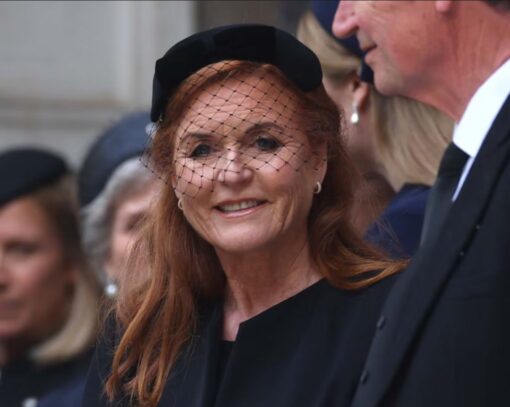London, September 21, 2025 — Leaked emails have revealed that Sarah Ferguson, the Duchess of York, privately apologized to convicted financier Jeffrey Epstein in 2011, following a period in which she publicly disavowed him.
The emails, obtained by investigative journalists from multiple sources, offer new insight into Ferguson’s relationship with Epstein and the pressures faced by public figures in high-stakes social circles.
In March 2011, Ferguson publicly condemned Epstein after media reports highlighted a £15,000 gift he had sent to help pay off some of her debts.
In statements to the press, Ferguson described her past association with Epstein as a “gigantic error of judgment,” emphasizing that she had severed ties and would avoid any future contact. “I deeply regret the misjudgment and recognize the consequences of my association,” she said at the time.
However, just weeks later, in an email dated April 2011, Ferguson referred to Epstein as her “dear, dear friend” and expressed regret for publicly distancing herself.

The email appears to have been written under considerable pressure from Epstein’s legal team, which reportedly threatened legal action against Ferguson.
In the correspondence, Ferguson wrote, “I wish to convey my heartfelt apologies and explain that my previous statements were influenced by circumstances beyond my control.”
The leaked email indicate that Ferguson felt caught between public perception and legal intimidation.
Advisors and representatives had strongly encouraged her to sever ties with Epstein, fearing reputational damage and public backlash. Ferguson’s subsequent private apology reflects the complex dynamics of navigating personal relationships while under intense public scrutiny.
A spokesperson for Ferguson clarified that the emails were composed under legal pressure and that Ferguson had no intention of undermining her public statements once she became fully aware of Epstein’s criminal activities.
“These emails were written in a highly pressured environment,” the spokesperson said. “The Duchess remains committed to her charitable work and regrets any association that might have caused concern.”
The disclosure has reignited debate over Epstein’s influence on prominent individuals and the lengths to which some were willing—or pressured—to maintain contact.
Epstein cultivated relationships with a wide network of high-profile figures, from royalty to business leaders, and documents like these provide rare insight into the personal and legal challenges faced by those within his orbit.
Experts in social ethics and public relations have noted that Ferguson’s situation highlights the challenges public figures face when disentangling themselves from controversial individuals.
“What Ferguson experienced is unfortunately not unique,” said Dr. Helena Forsyth, a sociologist specializing in elite networks. “When individuals operate in high-stakes social and financial environments, legal threats and public pressure can force decisions that are later scrutinized with the benefit of hindsight.”
Ferguson’s career, which includes authoring over 50 children’s books and participating in numerous philanthropic initiatives, has been punctuated by intense media coverage of her personal and professional decisions.
The leaked emails add another layer to the public narrative surrounding her, demonstrating how private communications can conflict with public statements and the scrutiny that follows.
Legal analysts have also weighed in on the implications of the correspondence. “Apologies issued under legal duress are a common tactic to mitigate risk, but they can complicate public perception,” said attorney Michael Whitaker.
“The key issue is whether such communications were coerced or voluntary. In Ferguson’s case, the context strongly suggests significant external pressure.”
The story further underscores the long-lasting impact of Epstein’s network on high-profile individuals. Investigative journalist Sarah Mitchell commented, “Epstein’s influence extended beyond financial gifts.
He exerted psychological and legal pressure on many, creating a climate of fear and manipulation that complicated relationships and decision-making.”
The leaked emails have prompted renewed calls for transparency regarding public figures’ past associations with Epstein.
Advocacy groups argue that understanding the full scope of these relationships is essential not only for historical accountability but also for ongoing efforts to prevent exploitation and abuse.
“These revelations show that even seemingly peripheral figures were affected by Epstein’s reach,” said Jennifer Kahn, director of a victims’ advocacy organization. “Acknowledging and scrutinizing these interactions is a step toward justice.”
Ferguson’s apology also draws attention to the intersection of royalty, media, and scandal. Members of the British royal family operate under heightened scrutiny, and any association with controversial individuals is amplified in public discourse.

“Being a public figure, especially in the royal family, comes with the expectation that private relationships are always examined under a microscope,” explained royal historian Dr. Amelia Graves. “Ferguson’s emails show the pressure of balancing personal loyalty and public responsibility.”
The timing of Ferguson’s apology—soon after her public disavowal—illustrates the delicate navigation between personal loyalty and public accountability. While she publicly condemned Epstein, the private correspondence indicates that fear of legal ramifications and ongoing personal connections influenced her actions.
Since the emails surfaced, Ferguson has not issued a new public statement but has continued her philanthropic and literary work. Observers note that while the revelations may reignite public debate, Ferguson’s ongoing efforts in children’s education and charitable outreach remain largely unaffected.
For the public, the case provides a cautionary tale about the complexities of personal and professional networks, particularly when high-profile individuals intersect with figures involved in criminal activities.
The leaked emails serve as a reminder that private and public personas can diverge dramatically under pressure, and that legal, financial, and social influences can shape decisions in ways not immediately visible to the public.
Ultimately, the disclosure of Sarah Ferguson’s private apology to Jeffrey Epstein sheds light on the broader ecosystem of influence, fear, and loyalty surrounding one of the most notorious figures of the 21st century.
While public condemnation is important, the emails reveal the nuanced reality behind the headlines—a reality shaped by legal threats, media scrutiny, and the human instinct to preserve personal relationships even under immense pressure.


